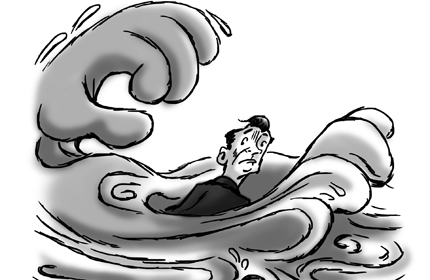Raging rivers wash away decades of development
 0 Comment(s)
0 Comment(s) Print
Print E-mail
Global Times, June 23, 2011
E-mail
Global Times, June 23, 2011
|
|
|
[By Liu Rui/Global Times] |
The floods hit China early this month, but I wasn't expecting them to strike my own hometown.
The little city of Zhuji, Zhejiang Province, where I was born, has been famous for its rice and fish since ancient times. The Puyang River is the mother of the city, irrigating the nearby rice paddies and providing fine harvests year after year.
But water sinks boats as well as floating them. The ancient Chinese coined the proverb "A flood is as terrible as a savage beast," and attached great importance to control of the rivers.
Thus every year strong men would be organized to repair and strengthen both banks of the river, ahead of the arrival of the rainy season, which usually falls between May and October in the region. June and July are among the rainiest months, and the most challenging for flood prevention.
I still remember my father and uncles working for the village to protect the river banks every spring just after the first crops of rice and wheat were planted. I never experienced a flood when I lived in Zhuji in the 1970s and 1980s, although sometimes alarms were issued and villagers made full preparations for evacuation.
Luckily, nothing really terrible happened.
With the economic focus shifting from agriculture to industry, and the lack of floods, people forgot the traditions of their ancestors. It's been a long time since I heard of one of my relatives taking part in a river management project. Some old slogans on the walls in town were the only evidence left of the once-prevailing concern for the river.
Everyone became concerned with making money above all else. And the living standards of my hometown certainly improved dramatically.
Two years ago I felt very proud to see the huge media coverage of my hometown for its fast and steady economic development. Reporters were invited there to help promote and publicize the good experiences Zhuji had gathered in the past decades. It was set as a model for its nationwide counterparts to learn from.
Last week, Zhuji once again became front-page news. But this time, it was a totally different story. Several villages in two townships are now almost invisible, drowned by the flood. On the CCTV report, all I could see was a few roofs poking through the water's surface.
There were losses everywhere. One of my neighbors was rescued from the roof of his shed in the field where he raised chickens and ducks. He is safe and has been evacuated to a hotel nearby, but he lost all his property.
The village came close to even worse disaster. This time there was no loss of life, but, had the river burst at night, there would have been dozens, if not hundreds, of casualties.
Village and town officials rang the alarms at about 2pm on June 16, just in time to evacuate all the residents in the worst affected villages.
Water gushed from the breach in the bank of the Puyang River soon after. It reminded me of another old proverb, "One ant hole will ruin a thousand-mile long dike."
What lessons can we draw from this tragedy?
The local government should take prime responsibility. No flood for 59 years doesn't mean no flood in the 60th year. We should always be prepared for the worst when dealing with the mighty power of nature.
Every year the government allocates a budget for flood prevention and control. But there's been little sign of the flood-prevention measures that once were common. Where did all that money disappear to?
Zhuji's economic achievements are impressive. But all of that can be washed away in a moment by natural disaster.
It's a lesson for not only Zhuji's officials, but for the governments at all levels.







Go to Forum >>0 Comment(s)